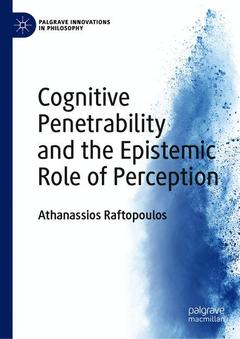Description
Cognitive Penetrability and the Epistemic Role of Perception, 1st ed. 2019
Palgrave Innovations in Philosophy Series
Language: English
Publication date: 03-2019
368 p. · 14.8x21 cm · Hardback
368 p. · 14.8x21 cm · Hardback
Description
/li>Contents
/li>Biography
/li>Comment
/li>
This book is about the interweaving between cognitive penetrability and the epistemic role of the two stages of perception, namely early and late vision, in justifying perceptual beliefs. It examines the impact of the epistemic role of perception in defining cognitive penetrability and the relation between the epistemic role of perceptual stages and the kinds (direct or indirect) of cognitive effects on perceptual processing.
The book presents the argument that early vision is cognitively impenetrable because neither is it affected directly by cognition, nor does cognition affect its epistemic role.
It also argues that late vision, even though it is cognitively penetrated and, thus, affected by concepts, is still a perceptual state that does not involve any discursive inferences and does not belong to the space of reasons. Finally, an account is given as to how cognitive states with symbolic content could affect perceptual states with iconic, analog content, during late vision.
Chapter 1- Cognitive Penetrability and the Epistemic Role of Perception.- Chapter 2- Cognitive Penetrability.- Chapter 3- Early Vision and Cognitive Penetrability.- Chapter 4- The Cognitive Effects on Early and Late Vision and their Epistemological Impact.- Chapter 5- Early and Late Vision: Their Processes and Epistemic Status.
Athanassios Raftopoulos is Professor of Epistemology and Cognitive Science at the Department of Psychology, University of Cyprus, Cyprus.
He has been a fellow at the Center for Philosophy and History of science at Pittsburgh University, USA, and has published more than 130 papers and books in philosophy of science, philosophy of perception, philosophy of mind, cognitive psychology, and cognitive science.
Divides and discusses visual perception in terms of 'early vision' and the often overlooked perceptual stage of 'late vision'
Provides an account of how cognitive states could affect perceptual states in a way that entails late vision is cognitive penetrability
Approaches problems using a unique perspective in which empirical studies and philosophical analysis are interwoven
© 2024 LAVOISIER S.A.S.





